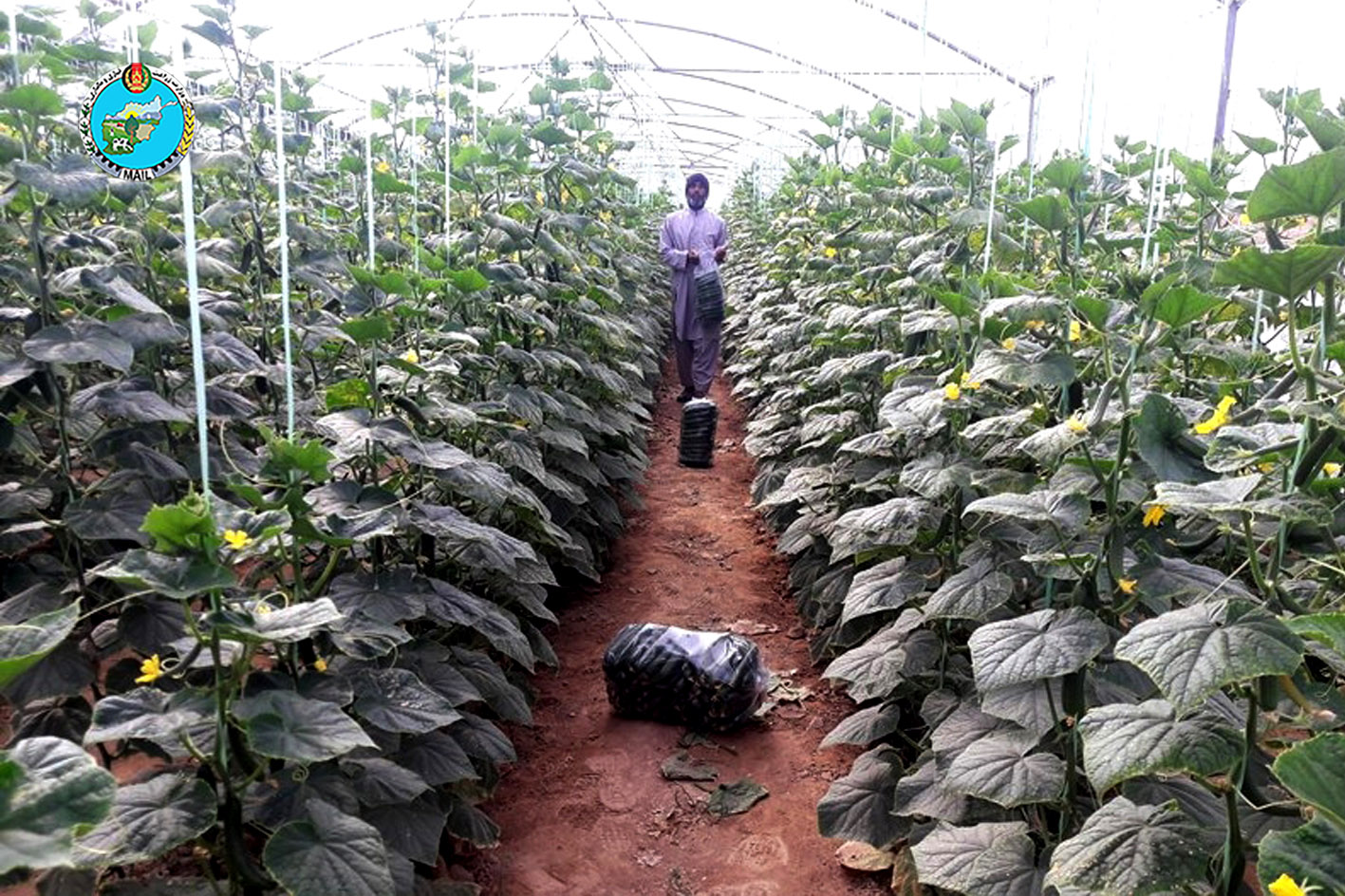Greenhouse Instead of Poppy: Abdul Latif earned 75,000 Afghanis from a Greenhouse in five months

Asad 28: August 16, 2020
With the efforts of the Ministry of Agriculture in one of it's projects, the cultivation of Greenhouse vegetables has replaced Poppy in Khak-e-Safid district of Farah province.
The Ministry of Agriculture, Irrigation and Livestock has built 119 Greenhouses in one of it's projects in Khak-e-Safid district of Farah province.
71 large Greenhouses were built for men, and 48 small for women who are dealing with Agricultural work in the district.
Ministry of Agriculture has built these Greenhouses to promote valuable Agricultural products and to prevent poppy cultivation and production.
In addition to preventing poppy cultivation, improving the local economy of farmers , receiving more from less land, raising production levels and introducing valuable Agricultural products for farmers, are other goals of Greenhouse sector in Khak-e-Safid district of Farah province.
The Ministry of Agriculture has been able to challenge poppy cultivation in the district by constructing protective walls, Dams, Siphons, irrigation canals, water mains, building productive Orchards, establishing commercial Hreenhouses, building home Gardens and distributing food processing equipment, are the main factors behind the reduction of poppy cultivation in the mentioned district.
The Ministry of Agriculture is working with 10 People's Councils through only one of it's projects, which has had positive results for the people.
Abdul Latif is 31 years old. He has three sons and lives in a family having 5 members in Nangabad village of Khak-e-Safid district, He is the only breadwinner in the family.
He owns two acres of land that he used to grow poppy before he owned a greenhouse from the Ministry of Agriculture, He took five Kilos of poppy from each acre of land and sold it for four thousand Afghanis per kilo, In one year, Abdul Latif could earn only 40,000 Afghanis from his land, much of which was spent trying to heal the damage poppy had inflicted on him and his family.
Abdul Latif says, when poppy was harvested, all the members of the family were busy collecting it and harvesting it.
He said that Collecting poppies is very detrimental to the health of all family members, specially, children and we were always afraid that one of the family members would become addicted to drugs.
But due to dissatisfaction with the health ills of poppy cultivation, a better way was found for Abdul Latif and a number of other farmers to cultivate useful and clean crops.
In 2018 Nabi Jan, Abdul Latif and Aisha were introduced to the Ministry of Agriculture's Agriculture Growth and Rural Development Project, After undergoing training in Greenhouse management, food processing, small and large business development, Disease control, and weed control, they acquired Greenhouses for productive production and economic growth.
Through one of its projects the Ministry of Agriculture built greenhouses for Nabi Jan and Abdul Latif on 400 square Meters of land and for Aisha on 60 square meters of land.It has also distributed 43 planting and harvesting equipment for them.
Now these peasants are engaged in growing valuable Agricultural products in their Greenhouses.
The greenhouse built for Abdul Latif produces two seasons a year and with less suffering brings him more fruit.
As Abdul Latif has cultivated cucumbers in the first season and he has gained five thousand kilogram cucumber in four monthes, He sold 15 Afghanis per Kilo of cucumber and earned 75,000 Afghanis in five months, 35,000 Afghanis more than poppy, but with good health and the presence of cucumber in his family's table, which leads to increased food immunity, Meanwhile his Greenhouses still continues to produce cucumbers.
Abdul Latif however, wants to earn a better income by cultivating Roman eggplant in the second season.
It should be remembered that in modern Agricultural systems, products obtained from greenhouses are useful and tasty and have many benefits when sold.
Nabi Jan is another occupant of the Ministry of Agriculture's greenhouses in the Red Wall village of Khak-e-Sefid district. Nabi Jan is 28 years old who has five sons and a daughter. Nabi Jan used to cultivate poppy in half of his 50 acres of land, and he had various problems and a meager income from health injuries.
Nabi Jan has now built vegetables for him in the greenhouses of the Ministry of Agriculture, and he is busy growing vegetables with his children.
He produces two seasons a year, in the first season he has planted cucumbers and in four months he has gained 5,500 kilograms, from which he has earned 82,500 Afghanis, and in the second season he intends to grow Roman eggplant to get a good income from Roman crops.
Due to security problems and bad customs, women were not allowed to work outside the home in this district, as in many other parts.
and with the construction of small Greenhouses for women farmers by this project of the Ministry of Agriculture, women farmers in creating Work culture has taken an active part, and small Greenhouses are a good source of income for them, and they work as financially as men.
Aisha who is 30 eyears old, she is an Agricultural woman in Nangabad village of Khak-e-Safid district.
She planted poppies with all members of his family on six acres of land she owned.
The Greenhouses built for her by the Ministry of Agriculture now produces three seasons a year, In the first season, she planted Roman eggplant, which gained 800 kilos and gained 20,000 Afghanis in four months. In the second and third seasons, Aisha plans to grow cucumbers and vegetables in winter.
The Ministry of Agriculture annually builds thousands of Greenhouses, and home gardens at various levels of business to grow the women's economy, and to provide food security to the beneficiaries, increasing vegetable production, increasing farmers' incomes and reducing imports in different seasons.